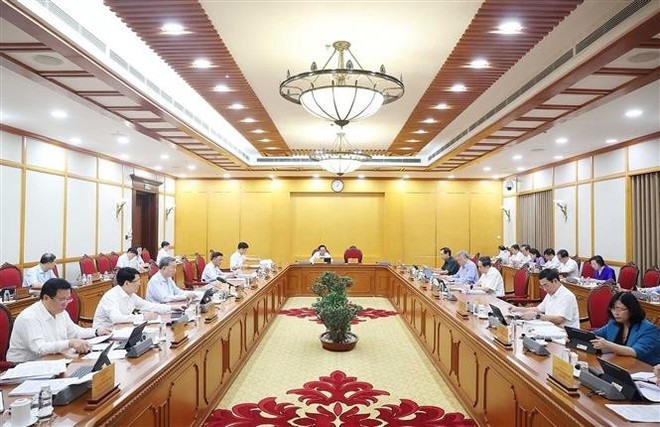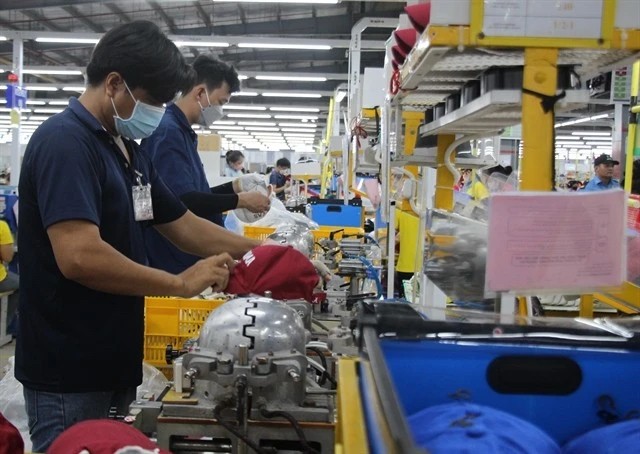Plan International, New Zealand support early childhood development in Gia Lai
(VNF) - On July 24, in Hanoi, Plan International Vietnam cooperated with Gia Lai Department of Education and Training and New Zealand Embassy in Vietnam to organise the national dissemination workshop of Gia Lai early childhood development project.
 |
At the meeting.
The event saw the attendance of Wendy Matthews, New Zealand Ambassador in Vietnam; Bui Khoa Nghi, Deputy Director of Gia Lai Department of Education and Training; and Pham Thu Ba, Plan International Vietnam Acting Country Director.
They joined teachers, officials and international experts to share new data on the benefits of investing in early childhood care and education in Gia Lai province.
Beginning from June 2012, the project was funded by the New Zealand Aid Programme, and led by Plan International Vietnam, Gia Lai Department of Education and Training (DOET), and provincial Women Union. It particularly focuses on the districts of Dak Po, An Khe, Kbang and Kongchro, as well as replicating the approaches more widely across Gia Lai.
The USD 7.2 million project, which concludes in October 2018 has reached 162,000 children and almost 10,000 teachers and staff from preschools and elementary schools across Gia Lai. Through the project, young ethnic minority children aged 0-8 has received early childcare since the first days, access to quality, culturally appropriate education, and support in school readiness.
Wendy Matthews, New Zealand Ambassador in Vietnam shared "The results to be presented today show the value of investing in the early years of life when children are developing core mental, physical and emotional skills. The project’s own data backs up these findings: 90 per cent of parents are now ensuring hygiene, nutrition and interactive play their 0-3 year olds, thanks to a training programme developed with the Vietnam Women’s Union. Construction of 18 new pre-schools and increased family engagement has helped preschool enrolment increase from 65 per cent to 98 per cent.
And as a result of improvements in pre-school years, students are now doing better in primary school, with achievement in maths and Vietnamese for 6 and 7 years olds increasing markedly.”
“These are more than just numbers; they are real improvements in the lives of children. This success is thanks to the practical training tools developed by DOET and Plan International for parents and teachers. New Zealand is proud to support this initiative and to see it shared with provinces and government agencies from across Vietnam,” she stressed.
Pham Thu Ba, Plan International Vietnam Acting Country Director shared, “Every child should have the opportunity to grow up in a setting that gives them the best possible chance to live a successful life. Every child should have the ability to have access to learning and nurture in the early formative years. I believe that the Gia Lai government has achieved this for their province and I am honoured that Plan International played a role in this achievement.”
According to Bui Khoa Nghi, Deputy Director of Gia Lai Department of Education and Training, this new approach creates long-term benefits for children’s mental and physical health, academic achievement, and self-estem. It also benefits society as whole in terms of higher labour productivity and lower level of social harm or health care costs. Gia Lai has seen the benefits of this approach and has, therefore, extended its use province-wide.
 |
A cooking class/nutrition education classes for mothers in Gia Lai.
The Gia Lai Early Childhood Development Project has four main components.
Firstly, supporting parents to be better caregivers in the home and community. The key training tool is the “Parenting Group”, delivered in partnership with the Gia Lai Women’s Union and covering the essentials o childhood development including hygiene, play, and nutrition.
Secondly, improving the quality teaching and learning in pre-schools. The key training tool is the “Professional Teacher Meeting” enabling teachers to peer review each other’s approach and build a more interactive learning enviroment for children. This component also included the construction or refurbishment of 18 pre-schools in the four target districts and new resources for the early childhood curriculum to better meet the needs of ethnic minority children.
Thirdly, improving the quality of teaching and learning in primary (elementary) schools. For pre-schools, the key training model was the “Professional Teacher Meeting”. In addition, the project developed child-friendly libraries in all nine target primary schools and new reading resources better suited to the needs of ethnic minority children.
Lastly, contributing to the policy enviromnent on early childhood care. Through a longitudinal study, the project will track the learning outcomes of children and identify the remaining challenges and the successes of the approach used in Gia Lai./.
Minh Chau
Recommended
 National
National
Vietnam News Today (Jun. 7): Prime Minister works with Estonian firms to accelerate projects in Vietnam
 National
National
Vietnam News Today (Jun. 6): Foreign Investment in Vietnam Surges in Five Months
 National
National
Vietnam News Today (Jun. 5): PM sets off for attendance at UNOC 3 in France, official visits to Estonia, Sweden
 National
National
Vietnam News Today (Jun. 4): Vietnam - Promising Candidate for Southeast Asia’s Next Powerhouse
Popular article
 National
National
Shangri-La Dialogue 22: Vietnam Highlights Some Issues of Ensuring Stability in a Competitive World
 National
National
Vietnam News Today (Jun. 3): PM Pham Minh Chinh to Attend UN Ocean Conference, Visit Estonia, Sweden
 National
National
Vietnam News Today (Jun. 2): Vietnamese Trade Mission Sounds Out Business Opportunities in United States
 National
National



